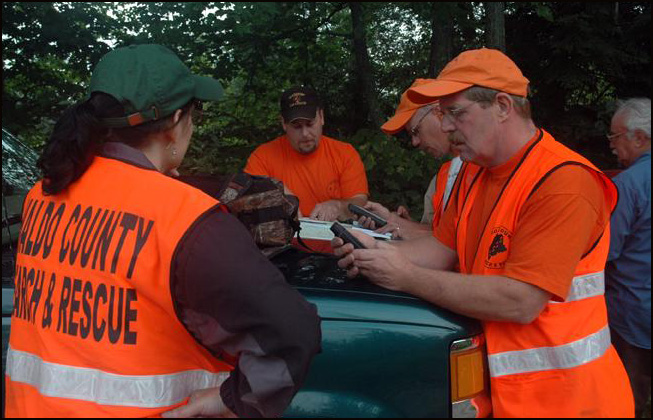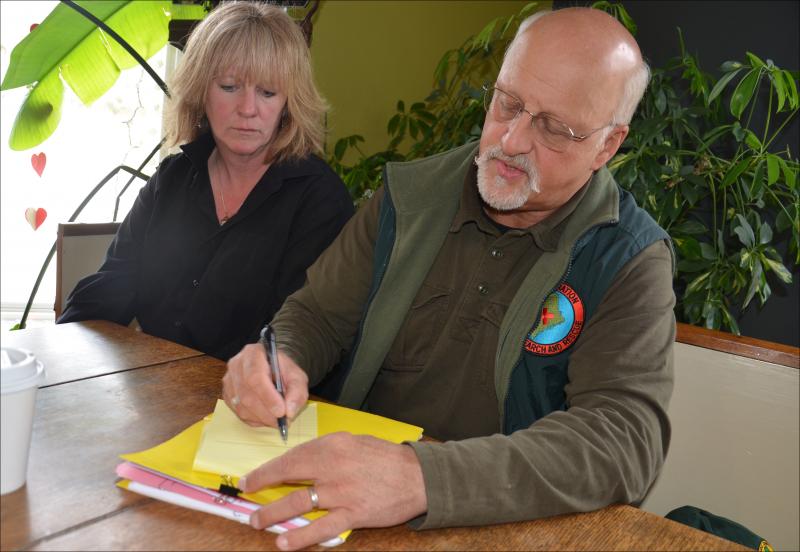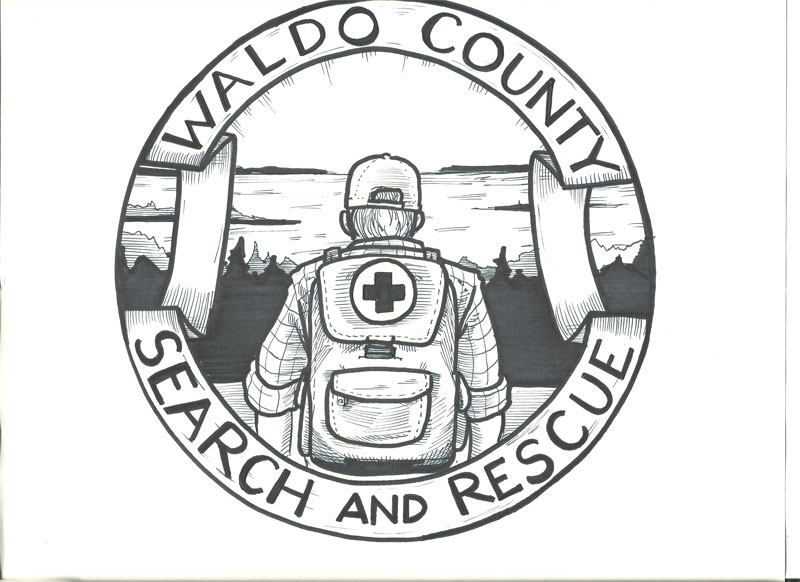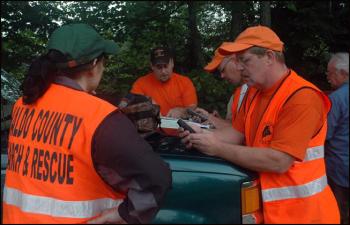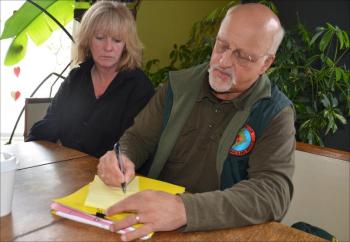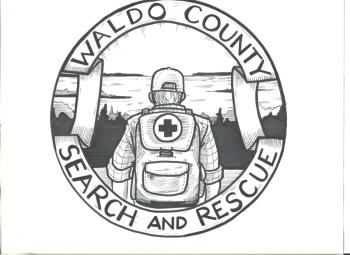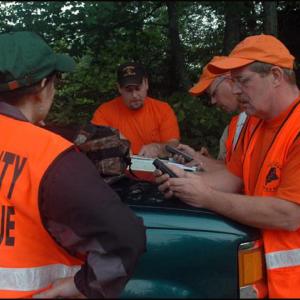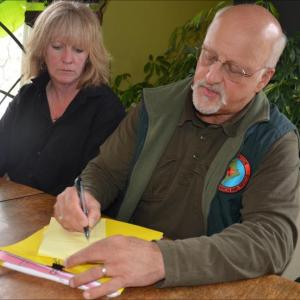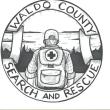Waldo County Search and Rescue: A dedicated effort to find people, clues, evidence
HOPE —When humans get lost in the woods, they do not travel in a straight line, especially when it is overcast. Those with Alzheimer's tend to walk until they just can't walk anymore. Autistic children may not respond to calls, and hide from rescuers. When search dogs go out to hunt for the missing, the scent can be easily contaminated by other humans, which is why rescuers discourage swarms of well-meaning searchers from combing the area before they send out the canine teams. Time is of the essence in any search; yet, it has to be methodical and organized.
These details, and hundreds of others, get immediately addressed when a call for help comes in, and rescue teams educated for such situations swing into action. Search and rescues do not just happen. They are a function of much training for specific scenarios, from mountaintop rescues to hunts through thick woods to potential river and lake drownings. Maine is a rural state; yet, just a small portion of the population knows how to survive in the wilderness when darkness and the temperature falls, and conditions get perilous for survival.
But there are people who spend time preparing to rescue those who do get lost, or entangled in threatening situations.
The Maine Association of Search and Rescue is holdings its 2013 Training Conference at Camp Bishopswood, on Lake Megunticook, in Hope May 18 and May 19.
The two-day conference will include presentations by:
Jocelyn Stohl, Vermont State Police (ret.), and contributing author of the text Lost Person Behavior, will offer insight into the psychology and behavior of "being lost."
Steve McCausland, public information officer at the Maine Department of Public Safety, will talk about the media's role in searches, and how to deal effectively with the media.
Lt. Kevin Adam, Maine Warden Service, will discuss what to expect at searches, how SAR is organized in Maine, and the process of being called out.
Tom Seymour, plant and foraging expert, will hold sessions on the flora of Maine, and plants that pose hazards to searchers.
Randy McEwen, teacher and columnist for North Woods Sporting Journal, will teach navigation.
Other workshops will discuss Lyme disease, tick-borne illnesses; searching for lost persons with autism; how local Emergency Management Agency can help a SAR group; and distinguishing human bones from animal bones.
The conference anticipates visits from the Maine Forest Service and LifeFlight of Maine aircrafts, as well as a other presenters and instructors.
Search and rescue guru John Ford will conduct a "self-guided search" during which participants can test their powers of observation. More information and registration details can be found on the Waldo County Search and Rescue.
This month, the Maine Association of Search and Rescue is holding its annual training conference in Hope, courtesy of Waldo County Search and Rescue Team, a group of 31 dedicated — and hardy — search and rescue volunteers who serve the 26 primarily rural communities in Waldo County, as well as the rest of the state when called upon. Every year, the state association holds its annual training conference in different parts of the state. This year, it is WCSAR which is hosting the event, with two days full of training sessions for the seasoned and novice volunteer.
"We've got a great program in the works," said Gary Drinkwater, director of WCSAR, and a resident of Northport. "We're looking forward to welcoming our fellow SAR teams from around the state, as well as a terrific group of instructors. Anyone involved in search and rescue in Maine will not want to miss this."
Waldo County Search and Rescue is one of the oldest of 15 organizations comprising the statewide Maine Association of Search and Rescue that helps carry out searches for missing people, victims, clues and evidence. Organized in 1985, the Waldo County Search and Rescue members have tackled a wide range of incidents. They have been called out to help look for missing skiers, lost vacationers, and locate a murder victim. They organize and practice throughout the year, and always welcome new volunteers.
"Perhaps our most overwhelming response is to that of a missing child," said Drinkwater.
The impetus for founding WCSAR followed two events that occured in summer 1985. One afternoon, a boy wandered away from a day camp in North Searsport. He was found in the morning, after spending the night alone in the woods. Six weeks later, a private plane crashed into the Penobscot River. The plane, along with the pilot and his passenger, were not found until three weeks later.
The folllowing winter, WCSAR was established, and since then, the group has met once a month to educate members in basic search, rescue and survival techniques, as well as reading and using maps, compasses and global positioning systems. Training also includes first aid and cardiopulmonary rescuscitation.
WCSAR joined the Maine Association for Search and Rescue, which became a nonprofit in 1990. All of the individual and regional search and rescue organizations in the state collectively hold the same mission: Save lives. Regional search and rescue organizations — they call themselves SARS — work with the Maine Warden Service when incidents occur, and train volunteers to get certified. The Maine Association for Search and Rescue acts as a liaison between the regional organizations and the Maine Department of Inland Fisheries and Wildlife's warden service.
In 2011-2012, there were 452 search and rescue calls made statewide, with incidents involving lost hikers and children, the despondent and suicidal people, and ost boaters and hunters.
In Waldo County, volunteers with WCSAR are regulary trained to help with emergencies across the state.
"The group is made up of folks with a wide diversity of experiences, but when the call comes out, the team responds as a unit, looking for that lost child, the missing hiker, or sometimes, even searching for clues in homicide investigations," according to WCSAR. The organization works with the Maine Warden Service, as well as Waldo County Emergency Management Agency. Its members consist of firefighters, people who work in the outdoors, emergency medical technicians, and civilians.
But WCSAR is always looking for new members.
"We would really like to see more younger people in our group," said Drinkwater, praising the ability of younger generations to handle computers, as well as quickly learn how to read maps and use compasses.
The training also includes learning how to build fires, build shelters, and "knowing how to survive," said Drinkwater.
And, training includes learning human behavior, how different people respond to being lost, and their instincts for survival.
When a person does go missing, protocol has Maine game wardens assuming lead responsibility for ensuing searches that are not in urban environments.
They first conduct a 'hasty search," which entails assembling wardens and walking quickly down paths and roads.
"Eighty percent of people are found by hasty searches," said Drinkwater.
If not, however, the wardens rely on the state search and rescue teams, such as Waldo County's, to help. A duty officer with dispatch will text team leaders across the state, putting them on alert to then assemble their respective volunteers.
If the missing cannot be found after a hasty search, the wardens then call the search dog teams, and establish contained areas — marking grids on maps to formalize how volunteers will comb through the woods and fields, carefully looking for clues. Ground scent dogs are generally bloodhounds, while others are considered air scent dogs, who go downwind to sniff for scents carried in the air. The dogs are sent into to search prior to large teams of volunteers entering the area because dogs get confused by too many human scents.
"We would contaminate with human scent," said Drinkwater. "We are not looking for just people," he said. "We are looking for clues and evidence that they've been there."
The teams may at times call in the equestrian search team, the Maine Mountain Search and Rescue, who are volunteers on horseback. Horses, said Drinkwater, are also able to smell cadavers.
Most people are found within a three-mile range, he said. But humans are not apt to walk in a straight line. They travel in circles.
"If you walk in a straight for a mile around here, you are going to hit a road," he said. "But people do not tend to walk in straight lines, especially when it is overcast."
Some of the situations that Waldo County Search and Rescue volunteers have responded to include helping to search Baxter State Park for a lost hiker, who was spotted from the air and removed by helicopter from an area well off the marked trail. He had suffered a severe knee injury, dehydration, and insect bites.
WCSAR members also help search in Union and Hope for a 75-year-old Union resident, which started as a night search. The missing man was found safe in Warren on the second day of the search.
Waldo County's tenets include:
Treat property you are searching on or training at with respect.
Show respect for the family and friends of the person you are searching for.
Give medical treatment only to the level of your training.
Keep all confidential information confidential until it has been cleared.
Follow directions given by law enforcement officers and search officials.
Do not show prejudice based on gender, sexual preference, age, race, religion, or mental capacity.
Treat fellow team members and other volunteers with respect.
- Treat property you are searching on or training at with respect.
- Show respect for the family and friends of the person you are searching for.
- Give medical treatment only to the level of your training.
- Keep all confidential information confidential until it has been cleared.
- Follow directions given by law enforcement officers and search officials.
- Do not show prejudice based on gender, sexual preference, age, race, religion, or mental capacity.
- Treat fellow team members and other volunteers with respect.
Event Date
Address
United States

